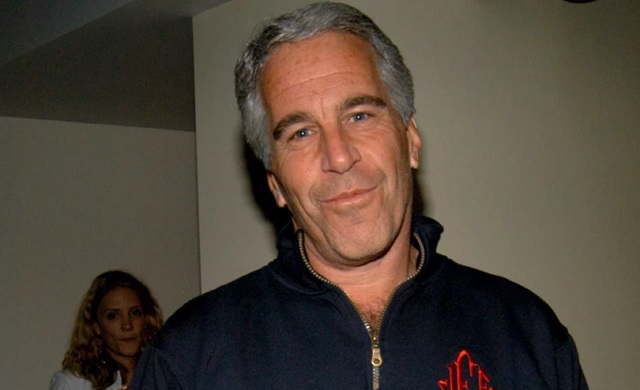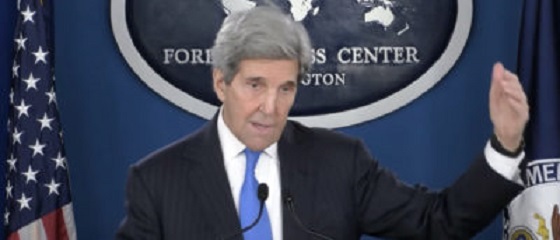espionage
Biden expands government’s power to spy on Americans without a warrant

From LifeSiteNews
Legal experts have pointed out that under an updated version of the Foreign Intelligence Surveillance Act (FISA), delivery personnel, cleaning contractors, and utility providers could all be forced to surveil Americans.
U.S. President Joe Biden has quietly signed legislation reauthorizing and expanding the government’s ability to spy on American communications without a warrant.
On April 20, Biden signed the reauthorization of Section 702 of the Foreign Intelligence Surveillance Act (FISA) that allows the government to compel a broader range of businesses to collect the communications of U.S. citizens when they are in contact with foreigners, according to legal experts.
The newly passed, updated version of Section 702 accomplishes this by expanding the definition of “electronic communication service providers” who can receive FISA directives to tap communications by dropping the qualifier “communication” from electronic service providers. The new amendment, therefore, makes access merely to equipment on which communications are carried or stored enough to legally surveil Americans.
While the amendment lists types of businesses that cannot be considered Electronic Communication Service Providers (ECSPs), including public accommodations, dwellings, and restaurants, ZwillGenBlog points out that the law still allows the government to “compel the assistance of a wide range of additional entities and persons in conducting surveillance under FISA 702.”
“The breadth of the new definition is obvious from the fact that the drafters felt compelled to exclude such ordinary places such as senior centers, hotels, and coffee shops. But for these specific exceptions, the scope of the new definition would cover them — and scores of businesses that did not receive a specific exemption remain within its purview,” ZwillGenBlog explained.
The legal experts noted that among the entities that could be forced to surveil Americans under the amendment are “the owners and operators of facilities that house equipment used to store or carry data, such as data centers and buildings owned by commercial landlords,” as well as others who can access such equipment, including “delivery personnel, cleaning contractors, and utility providers.”
ZwillGenBlog also pointed out that “any U.S. business could have its communications” — if involving a foreigner — “tapped by a landlord with access to office wiring, or the data centers where their computers reside.”
Democratic U.S. Sen. Dick Durbin of Illinois had tried and failed to pass an amendment that would require government officials to obtain a warrant before spying on American communications, according to the Associated Press (AP).
“If the government wants to spy on my private communications or the private communications of any American, they should be required to get approval from a judge, just as our Founding Fathers intended in writing the Constitution,” Durbin said.
Critics of the new amendment warn that over the past year alone the FBI has unconstitutionally spied on Americans, including Republican U.S. Rep. Darin Lahood of Illinois, who serves on the Permanent Select Committee on Intelligence and the Committee on the Chinese Communist Party, as well as Americans present at or near the Capitol on January 6, 2021.
Under Section 702 of the Foreign Intelligence Surveillance Act (FISA), passed in 2008, the National Security Agency (NSA), operating inside the United States, is authorized to collect communications of foreigners overseas for foreign intelligence purposes without a warrant “because courts have held that foreigners have no Fourth Amendment rights,” according to Elizabeth Goitein.
“Although ostensibly targeted at foreigners, Section 702 surveillance inevitably sweeps in massive amounts of Americans’ communications,” Goitein further noted.
“Recognizing the impact on Americans’ privacy, Congress required the NSA to ‘minimize’ the sharing, retention, and use of this ‘incidentally’ collected U.S. person data. But the government and the FISA Court have embraced an interpretation of ‘minimize’ that is remarkably … maximal.”
“The NSA shares raw data with multiple other agencies — including the FBI and the CIA — and all of them retain the data for a functional minimum of five years. Moreover, the FBI routinely combs through it looking for Americans’ communications to use in purely domestic cases, even in situations where the FBI lacks a factual predicate to open a full investigation,” Goitein continued.
There are other means by which the U.S. government can spy on Americans. In 2022, Biden issued an executive order (EO) that allows the government to surveil Americans for broadly defined reasons including understanding “public health risks,” “political instability,” and the “threat” of climate change.
The EO was ostensibly written to “enhanc[e] safeguards” for “United States Signals Intelligence Activities,” which is intelligence gathering by the interception of signals, including communications, such as through cell phones, or those not used in communication. An accompanying fact sheet explains that the EO is meant to help “implement the U.S. commitments under the European Union-U.S. Data Privacy Framework (EU-U.S. DPF)” in an effort to “restore trust and stability” to transatlantic data flows.
Alongside permitting spying for the purposes of sizing up the capabilities of foreign entities, the EO permits signals intelligence collection for “understanding or assessing transnational threats that impact global security, including climate and other ecological change, public health risks, humanitarian threats, political instability, and geographic rivalry.”
The document’s lack of elaboration on such so-called “transnational threats” raises the question of the true scope of activity now officially subject to spying by the U.S. government, which is potentially massive.
espionage
Soros family has been working with State Department for 50 years, WikiLeaks shows

From LifeSiteNews
Files from State Department officials as early as the 1970s show the US government helping the family of radical leftist financier George Soros secure deals and funding.
The U.S. State Department has been working with the Soros family for at least 50 years, Mike Benz demonstrated using diplomatic cables published to Wikileaks.
Benz, a former deputy assistant secretary at the U.S. State Department, explained in a video posted to X on Sunday that he searched for the terms “Soros” and “Open Society Foundation,” which was created by Soros, in Wikileaks’ collection of diplomatic cables. His goal was to “create a comprehensive tapestry of all U.S. state department involvement with Soros and the Open Society Foundation in every country in the world.”
The former state department official, now the executive director of the Foundation for Freedom Online, wanted to document why it was said that George Soros is treated by the U.S. like an “independent entity” akin to a country.
In a 1995 piece published by The New Yorker, former U.S. Ambassador to Turkey Morton Abramowitz said of Soros, “he’s the only man in the US who has his own foreign policy — and can implement it.”
Strobe Tallbott, former deputy secretary of state, also said of the far-left financier, “It’s like working with a friendly, allied, independent entity, if not a government. We try to synchronize our approach to the former Communist countries with Germany, France, Great Britain — and with George Soros.” This he “added with a grin,” wrote Connie Bruck.
Benz reviewed key cables from State Department officials as far back as the 1970s demonstrating the U.S. government’s involvement with the Soros family in what appeared to be a quid pro quo relationship.
In one 1976 cable from former U.S. Secretary of State Henry Kissinger, it was shown that the Brown & Root (now Halliburton), a CIA-linked company known for work on military installations and off-shore drilling platforms, wanted to “go all out” for the construction of a port in Santa Clara, Gabon, a country on the west coast of Africa.
It is noteworthy that Brown & Root’s co-founder Herman Brown was granted a covert security clearance for work with the CIA in 1953 “for use as a covert associate.” As of the 2000s, the company was one of George Soros’ top five holdings, Benz showed.
Referencing Brown & Root’s Manager of International Sales, Kissinger wrote, “O’Sullivan has just come from detailed discussions with Soros Associates to develop background for on-site estimates of construction timetable and costs … to be used in forthcoming talks with Gabon officials.”
Soros Associates, Benz explained, was run by George Soros’ older brother Paul Soros, now deceased.
The cable, addressed to the U.S. Embassy in Gabon, seemed to pressure assistance for the construction of this port, noting that while the request for help with it came at a “difficult time,” “strong interest” in the project and other reasons “preclud[ed] deferral.”
Another series of messages show that the U.S. Department helped the Soros family to secure a contract for the port in Gabon.
According to one cable, the director of the Santa Clara port, named as “Damas,” “said that meetings had been held within the Government of Gabon and were continuing which should lead shortly to the elimination of all but a few offers and that Soros was in a very good position.”
Benz remarked, “Here is the head of the State Department in Gabon backchanneling with the head of the port to make sure that Paul Soros won the bid. Eliminate all of the opposition.”
Another message read, “It appears Soros Associates virtually certain to get engineering contract for Port.”
“Not only is the US State Department negotiating Soros’ deals, helping him secure the deals. They’re also backchanneling so that foreign governments can pay [S]oros so that Soros makes his appropriate profit on the deal,” remarked Benz.
“There is this favors-for-favors relationship that goes back five decades, And those are just the earliest cables we have,” he added.
The exposure of these cables has been described as an “ultra massive find” by journalist Alex Jones.
The find is massive because George Soros himself, as was admitted by Morton Abramowitz and Strobe Tallbott, has foreign policy interests independent of the U.S. and over the past decades has demonstrated influence on U.S. domestic policy in favor of an impotent justice system, internet censorship, and a wide range of left-wing causes such as abortion, euthanasia, and population control, as well as homosexual “marriage,” and transgenderism. In other words, as some commentators have put it, his impact has been to erode the moral fabric of America and weaken the country.
espionage
Trump: “I HAVE JUST SIGNED THE BILL TO RELEASE THE EPSTEIN FILES!”

President Trump moved Wednesday to end years of secrecy surrounding one of the nation’s most notorious scandals, signing legislation that compels the Department of Justice to hand Congress virtually every scrap of material tied to Jeffrey Epstein. The president announced the move on Truth Social, writing, “I HAVE JUST SIGNED THE BILL TO RELEASE THE EPSTEIN FILES!”
Trump reminded supporters that he personally pressed House Speaker Mike Johnson and Senate Majority Leader John Thune to fast-track the legislation. “Because of this request, the votes were almost unanimous in favor of passage,” he wrote, pointing to the rare level of bipartisan agreement behind a bill that forces unprecedented transparency. The Epstein Files Transparency Act requires the DOJ to deliver all unclassified records — and as much classified material as possible — to Congress within 30 days. It also directs Attorney General Pam Bondi to provide lawmakers with a list of government officials and other “politically exposed persons” tied to Epstein within just 15 days.
The measure sailed through the House in a staggering 427–1 vote Tuesday before clearing the Senate unanimously. Its path to passage wasn’t always straightforward. For months, the Trump administration had sparred with lawmakers pushing for the release, with the president often calling the frenzy around “Epstein files” a Democrat-driven hoax designed to smear him.
In his Truth Social post, Trump leaned into the history, reminding Americans that Epstein “was charged by the Trump Justice Department in 2019 (Not the Democrats!)” and that the disgraced financier “was a lifelong Democrat” who poured money into Democrat campaigns. The president also pointed to Epstein’s well-documented relationships with high-profile Democrats, listing figures such as Bill Clinton — “who traveled on his plane 26 times” — former Treasury Secretary Larry Summers, activist billionaire Reid Hoffman, House Minority Leader Hakeem Jeffries, and Delegate Stacey Plaskett. “Perhaps the truth about these Democrats, and their associations with Jeffrey Epstein, will soon be revealed,” Trump wrote.
He added that the DOJ, under his direction, has already provided Congress nearly 50,000 pages of Epstein-related material — a stark contrast, he said, to the Biden administration, which “did not turn over a SINGLE file or page related to Democrat Epstein, nor did they ever even speak about him.”
For Trump, the transparency push is as much about exposing what Democrats don’t want voters to see as it is about delivering documents. He argued that the left had leaned on “the ‘Epstein’ issue” to distract from the “AMAZING Victories” of his administration. Now, with the bill signed and agencies under a firm deadline, he predicted the political tables are about to turn.
“This latest Hoax will backfire on the Democrats just as all of the rest have!” he wrote — a warning, and a promise, as Washington braces for whatever the next 30 days will reveal.
-

 Food1 day ago
Food1 day agoCanada Still Serves Up Food Dyes The FDA Has Banned
-

 Daily Caller2 days ago
Daily Caller2 days agoJohn Kerry Lurches Back Onto Global Stage For One Final Gasp
-

 Energy12 hours ago
Energy12 hours agoCanadians will soon be versed in massive West Coast LPG mega-project
-

 Alberta1 day ago
Alberta1 day agoNet Zero goal is a fundamental flaw in the Ottawa-Alberta MOU
-

 Addictions1 day ago
Addictions1 day agoManitoba Is Doubling Down On A Failed Drug Policy
-

 National1 day ago
National1 day agoEco-radical Canadian Cabinet minister resigns after oil deal approved
-

 Alberta21 hours ago
Alberta21 hours agoKeynote address of Premier Danielle Smith at 2025 UCP AGM
-

 COVID-191 day ago
COVID-191 day agoFDA says COVID shots ‘killed’ at least 10 children, promises new vaccine safeguards




